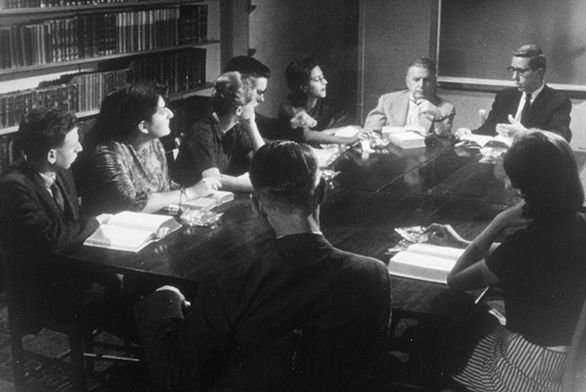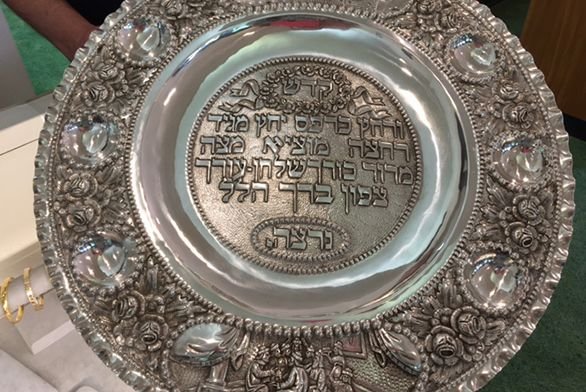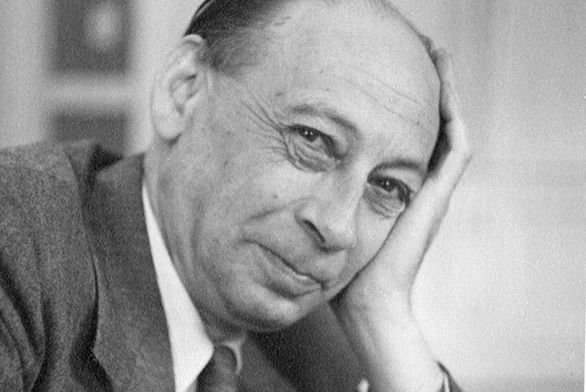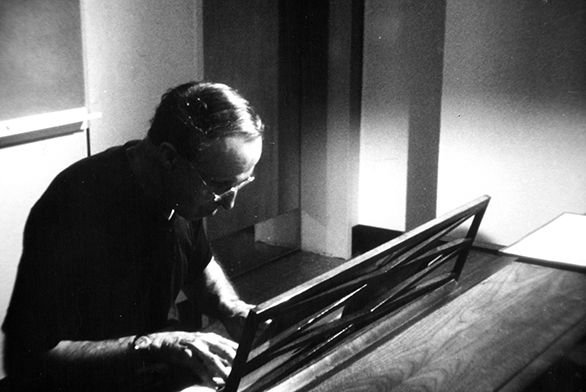Gift Honors Refugee Tutors
April 6, 2018 | By Tim Pratt

As World War II loomed in 1930s Europe, a Russian philosopher named Jacob Klein fled to the United States.
The pipe-smoking, Plato-reading, Heidegger-taught academic had worked at universities in Berlin, Marburg and Prague. The Nazi rise to power, however, forced Klein and thousands of other Jewish people—including many academics—to flee the continent.
Klein, already well-known for his book Greek Mathematical Thought and the Origin of Algebra, arrived at St. John’s College in Annapolis in 1938—one of a number of refugee tutors who joined the faculty over the next two decades. The group played a prominent role in the early success of the Program.
To honor those tutors, St. John’s alumna Vivian Ronay (Class of 1965) donated a Seder platter to the college. Seder platters often are used during Passover. It is set to go on display later this spring.
“I thought this platter, installed in a place where students might often pass, would be useful to acknowledge very important people who helped the college survive,” Ronay says.
The New Program

When St. John’s President Stringfellow Barr and Dean Scott Buchanan started the great books Program in 1937, the country was only a few years away from war. Soon, the future of the college was put in peril.
Students went off to fight all over the world, and enrollment dropped significantly. The Navy even attempted to seize college land.
Administrators and faculty members fought the takeover attempt, traveling to Washington, DC. to testify passionately in opposition. Klein, known as “Jasha,” was among them.
Ultimately, the college weathered the storm, and enrollment—and the health of the college—rebounded. Klein went on to serve as dean from 1949 through 1958. He remained a part of the faculty until his death in 1978.
“The refugees from the Nazis were a strong force in the college in the early days,” says tutor Eva Brann, 89, who escaped Germany as a child in 1941 and joined the St. John’s faculty in 1957. “Barr and Buchanan were very friendly to this community.”
Brann says the tutors from overseas—herself, Klein, Simon Kaplan and Viktor Zuckerkandl among others—shared a connection. However, the connection had less to do with their roots and more to do with their passion for liberal education. American tutors welcomed them warmly, she says.
“In this community, (these tutors) were honored for their experience and their learning, and because they were individually such personalities,” Brann says. “All of us here were so integrated and happy to be here. We were friends with everybody.”

Brann was close with Klein and his wife, and often visited their home. On one occasion in the mid-1960s, Klein invited faculty members over for a reading of his new book, A Commentary on Plato’s Meno. Throughout the next two days, Mrs. Klein served the group “the most delicious meals” as Jacob Klein read the manuscript aloud.
“That was the kind of thing that happened in the early days,” Brann says.
Lasting Legacy
Brann arrived at St. John’s after working for years as an archaeologist overseas, and later an archaeology instructor at Stanford University. Her passion for the great books curriculum and desire to learn were evident, says tutor emeritus John White (Class of 1965).
“That tremendous appetite to gorge yourself on everything, she had that,” White says. “She made everything very exciting.”
It was an exciting time at St. John’s, White says. Tutors and students were dedicated to the great books, he says, and many developed close bonds.
After lectures, Brann and other tutors would head to the Kaplan home to share snacks and continue discussions. Kaplan, a Jewish refugee from Russia, was well-versed in Kant. Conversations often continued until early morning.
“(Kaplan) was gentle but firm, and everybody loved him,” Brann says.

Ronay, who donated the Seder platter, has fond memories of these tutors, too. She recalls taking freshman chorus with Zuckerkandl, a Jewish Austrian musicologist who emigrated to the United States in 1940. Zuckerkandl joined the St. John’s faculty in 1949, and taught at the college until retirement in 1964.
“We learned a lot from him and were filled with enthusiasm about music,” Ronay says.
The legacy of these prominent figures in St. John’s history continues today. The Jacob Klein Conference Room in Hodson House serves as a modern meeting space on campus. Zuckerkandl wrote a book used in the college’s music tutorial, The Sense of Music. Brann still leads seminars at the college, too.
For Ronay, St. John’s is an appropriate final resting place for the platter. A family member purchased it years ago in Hungary.
“I was thinking of a place where this would have some significance, and that’s how I thought of St. John’s,” she says.

